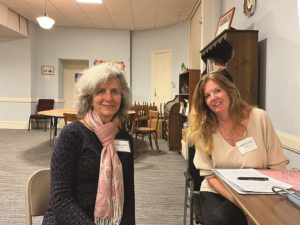WELLFLEET — Dr. Margaret Tilton is out to change the ways people — both patients and physicians — approach treatment for depression and addiction. The starting point, she believes, is to “break down the artificial division between physical and mental health.”
Tilton, who lives in Wellfleet, started bringing that belief into practice at a free “health ministry” at the First Congregational Church here in October 2019. The clinic, called “Living Water,” closed in March 2020 because of the pandemic but reopened in October 2021.
In the church’s large community room, on two Tuesday nights each month, those seeking care step into five treatment stations spaced some 10 to 15 feet apart. Each one has a chair, a small plant, and a timer. Church volunteer Christine Cook takes patients’ blood pressure and hands out alcohol swabs, which they use to clean their ears.
The ears are where Tilton’s acupuncture needles go. From there, she explains, the treatment can resonate through the whole body. It’s a protocol that follows the guidelines of the National Acupuncture Detoxification Association.
Classical guitar music plays in the background as patients sit quietly for 30 minutes, feeling light pressure in both ears and a soft sense of flow in the torso.

A tragedy in her own family is what put Tilton on this path. In 2017, when the family was living in New Hampshire, her son George committed suicide with a gun. He had been diagnosed with depression at age nine, a condition that intensified with adolescence. Conventional modes of treatment proved powerless against the disease.
Tilton testified in support of New Hampshire House Bill 287, a “red flag” gun bill that passed both houses of the legislature but was vetoed by Gov. Sununu in 2020. “There can be no meaning to George’s senseless death unless we create that meaning” she said.
Sununu may have ignored her plea, but Tilton emerged from the experience determined to push back against what she calls “deaths of despair.” Worried about rising drug and alcohol abuse on the Cape and inspired by a sermon, she says, she proposed the clinic to the church.
Tilton combines her conventional medical training, which includes an M.D. from the University of Medicine and Dentistry of New Jersey (now Rutgers Medical School), with acupuncture. Her specialty is already an unusual one: physiatry — which emphasizes nonsurgical therapies for muscular-skeletal and neurological problems. She added acupuncture to her repertoire in 2001 by completing the program in medical acupuncture for physicians at UCLA, and she maintains a practice at Healing Arts Collective in Orleans.
Tilton thinks the main reason conventional rehabilitation programs do not work for many people is that they focus on remorse and revisiting the past, which, she believes, can end up working against a person’s ability to imagine a life free from addiction.
What Tilton would like treatment to focus on, she says, is the connections between one’s body and the rest of nature. She likes the way acupuncture “tends to open people up to understanding their own bodies.” That understanding can encourage physical expression rather than the physical repression that comes with opioid use, she says. It can also break down barriers against connection.
Max Stone, a construction worker from Truro who has been in a suboxone maintenance program for seven years for heroin addiction, explained how the acupuncture therapy complements the suboxone therapy. “It really relaxes me,” he said in a recent interview. “It grounds me; it’s a nice time-out, and it helps me recharge.”
It also may have helped him restore aspects of his life that his heroin addiction had taken away. “I am in a relationship,” he said. “I’m staying healthy, and I am playing the guitar again.”
Not every client comes to the clinic for addiction treatment, however. Joy Long, a craniosacral therapist from Provincetown, comes “for general health and to be calm,” she said. Acupuncture “works subtly,” she added. “You don’t notice a big shift, but it works.”
The treatment is given with no strings attached. “What the clients receive is theirs,” said Tilton. “There is no need to report back. The idea is to move forward.”
The free Living Water clinic will be open twice each month through the winter: Jan. 4 and 25; Feb. 1 and 22; and March 22 and 29. Weekly sessions will resume in April. Masks are required at the clinic.



